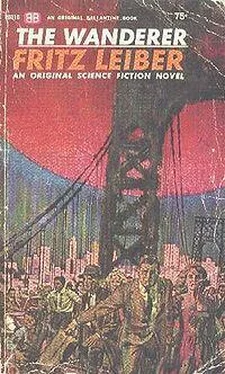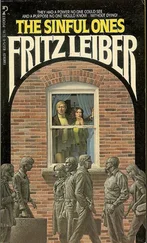Hunter frowned at him warningly and Doc hastened to say: “Now, don’t anybody get me wrong — we’re in no danger right now, in fact, just the opposite. The high-water interval here is about ten hours, which means a low tide comes about four hours after the moon’s at the top of the sky. In other words, in about an hour the tide’ll be dead low. See how far away the edge of the surf is? That leaves us ample time for a good rest — which I for one fully intend to take.”
“But whaddya mean, Doc, the tide?” Wojtowicz asked.
Again Hunter frowned and shook his head slightly.
Doc said to Hunter: “No, Ross, I think we better face up to it now when we’ve got a breathing space.” Then, turning toward Wojtowicz: “You know of course how the moon — the mass of the moon — is the main cause of the tides? Well, now we’ve got the Wanderer out there. It’s about the same place as the moon, so we can expect the tides to have about the same general pattern as before.”
“That’s good,” Wojtowicz said. “For a minute you had me scared.”
But most of the others were looking at Doc now and they weren’t smiling. He sighed and said: “However, judging from the way it’s captured the moon, the Wanderer must have a mass about as great as Earth — in other words, a mass eighty times that of the moon.”
There was a rather long silence. The one word “eighty” hung in the air like a gray rock, getting bigger and solider every second. Only the Ramrod and his two women didn’t seem greatly concerned. Hunter was frowning worriedly, watching reactions. Rama Joan, her lap once more a pillow for her sleeping daughter, suddenly smiled at Doc warmly. Mrs. Hixon put out her hands a little as if to say, “But…” Her husband drew them down to her lap and hugged her a little tighter as he nodded solemnly at Doc. Paul did the same, at last putting an arm around Margo. The Little Man pocketed his notebook and folded his arms.
Doc looked back at them all with a rather sorrowful, thoughtful grin.
It was young Harry McHeath who finally put it into words.
“You mean, Mr. Brecht, that although the tides will be coming at the same times and in the same general way as before, they’ll be… eighty times bigger?”
“He didn’t say that!” Hunter interposed hotly. “Rudy, you’re not allowing for the age of the tides. We should have a day’s grace in any case. Besides that, tides are a resonance phenomenon — it should take quite a while for the oceanic tidal bands to get to vibrating in a larger amplitude.”
“That may be true,” Doc said. “Also there’ll be spill-over effects to moderate the factor of eighty. However,” he went on more firmly, “that two-tone planet is out there, and thinking isn’t going to change its mass. You’ve seen what it’s done to the moon. Whether it’s going to take seven hours or a week, the big water’s coming, and when it does I’m going to feel securer if I’ve got a couple of hills under me. That’s why I inquired about Monica Mountainway,” he explained to the Hixons. “ Nevertheless —” he continued very loudly, checking the excited flood of talk just beginning — “ before a man makes an effort, he gathers his strength — as I’m going to do right now. Anyone wants to waste energy jabbering, go ahead. He won’t bother me.”
And he stretched out on four chairs, put his arm across his eyes, and, presently, gave out with a large, theatrical snore.
Don Merriam, orbiting for a second time behind the Wanderer, suddenly thought of the menace to Earth which the mere physical presence of the strange planet constituted. Why, there would be earthquakes — possibly — and gigantic ocean tides — certainly, though he wasn’t sure how quickly they’d build up — and there might be…well, he didn’t think the Wanderer could crack the Earth at this distance, but just the same he wished he could look at Terra right now, with his binoculars, and reassure himself.
It was his duty to warn Earth, or at least to try, no matter how hopeless the attempt seemed. He warmed the radio of the Baba Yaga and began alternately to send and listen. Once he thought he heard the beginning of a reply, but it faded.
He wondered if anything down on that green-spotted black hemisphere could be listening in.
Arab Jones and his weed-brothers on Manhattan Island were almost twice as far into the day as the saucer students were still in the night, since the dawn-line at this moment was sweeping west across the Rocky Mountains at its customary 700 miles an hour, also bringing rosy daybreak and the buzzards to Asa Holcomb’s mesa.
Somewhere near Roosevelt Square Arab pointed up at the roofs and cried: “There they are!”
High and Pepe looked. The low roofs were lined with people, explaining in part the mystery of deserted 125th Street. Some of the people were looking down at them, and a few were beckoning urgently and calling.
But it was impossible to make out the words because of the loud chugging of an abandoned taxi, skew-parked so close by that High clutched one of its open doors to steady himself.
“They crazy they think they escape the bombs that way,” Pepe said, peering upward. “Bombs come from space, don’t burrow up through the lock from old Pellucidar.”
“You sure of that?” High demanded. “Maybe that fireball tunneling from the river!”
“They all awaiting the glorious fireball!” Arab cried loudly, spreading his arms to comprehend the roofs. “They all dead already. Like Manator! They a rooftop wax museum! All New York!”
Abruptly the fear-kick in that last vision became absolutely real fear, and the thought of being spied upon and chittered at and lured and finally, irresistibly summoned by all those dark, wax-skinned living mummies fifty feet overhead became quite intolerable.
“Let’s get out of here!” High yelled. He crouched down and squat-stepped into the front of the taxi. “ I getting out!”
Arab and Pepe piled into the back. The forward lurch of the taxi slammed the door shut and sent them back against the cold, slick leather cushions as High headed west, gathering speed as he wove around abandoned cars.
The stampede of sections of the New York City Police and Fire Departments, marring the metropolis’ relatively swift and sensible preparations for catastrophe, was due to a number of factors: exaggerated reports of the tidal bulge at Hell Gate and the quake damage to the Medical Center on upper Broadway, scrambled directives sent out by a water-shorted computer in the underground center of the new interdepartmental coordinating system, and false reports of riots around the Polo Grounds.
Yet just plain nerves played their part — naked fear operating alongside the frantic urge to rush out and somehow play the hero. It was as if the Wanderer were finally bringing true the old lunatic superstitions’ about the moon pouring down rays of madness. All over the Western Hemisphere — in Buenos Aires and Boston, in Valparaiso and Vancouver, there were the same wild, purposeless sorties.
High Bundy was stepping on the gas three blocks west of Lenox when he and Pepe and Arab heard the sirens coming. At first they couldn’t tell where they were coming from, only that they were coming, because they were getting louder fast.
Then the cab crossed Eighth Avenue, and as the raucous wailing crescendoed they saw charging toward them up Eighth, not a block away, two squad cars abreast and what looked like more behind them, their red business-lights flashing.
High stepped harder. The sound of the sirens should have cut down for a couple of seconds while there were buildings between the cab and the police cars. But it didn’t. It got louder.
There was an old jalopy abandoned smack in the middle of the next intersection. High aimed to pass it to the right A Black Maria and a fire chief’s car hurtled out of Seventh Avenue from the south and swerved around the jalopy to either side. High stepped to the floor and held his course, just missing their tails, and got across Seventh feet ahead of a big, end-swinging firetruck following the other two cars by hardly a length. Pepe glimpsed the great red hood and the wide-eyed face of the driver and clapped his hands to his eyes, it was so close.
Читать дальше










